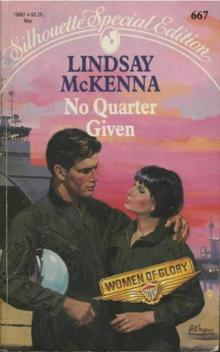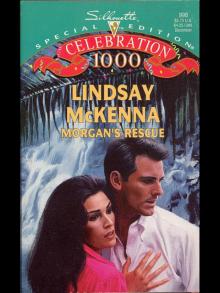- Home
- Lindsay McKenna
Danger Close (Shadow Warriors) Page 36
Danger Close (Shadow Warriors) Read online
Page 36
Mackey studied Fremont as she sat across the aisle in the plane from him. She was still listless and showed little desire to live. He grudgingly remembered Tucker’s lecture on that very topic. She and Boland had gone through so much together in such a concentrated span of time that she felt his loss doubly hard. The reporters, once the news release was announced, had hounded Cathy mercilessly. He had ordered her to say “no comment” and dodge their questions. Fredericks did not want anything misunderstood or taken out of context.
NURSE JUDY Chapman came on duty, relieving Ann Watson, the ICU supervisor. She peered over the monitoring equipment at a Marine who had been in a coma for five weeks.
“No change?”
Her supervisor gave her a pensive smile. “You never give up asking that question, do you?”
Judy, the petite nurse with blond, short hair, shrugged. “I’m always holding out hope for the hopeless. You know that.”
Ann rose. “Don’t we all?”
“I just finished watching that television broadcast of Herrington’s in the lounge. Looks like there’s a big hearing concerning the WLF starting today. Can you imagine what that poor girl, Cathy Fremont, is going to go through?” Judy sat down at the nurse’s station.
Ann nodded, “She’s the one the captain rescued,” she said, her gaze drifting back to the Marine once again.
“Humph. If you ask me, this whole situation is fishy. Why has Dr. Cornell absolutely forbid ICU personnel to admit that Captain Boland is here?”
Ann agreed with a nod of her head. “Something’s going on, that’s for sure.”
“Rumor has it that Corporal Fremont and Captain Boland were close. Do you think there’s anything to that?”
With a shrug Ann said, “You’re the one who saw Herrington’s broadcast. What do you think?”
“There’s no way to tell. But remember what the flight nurse said when they had the captain flown from Bangkok to here? That Fremont was temporarily in the captain’s outfit?” Judy looked up to comment and saw her supervisor’s face drain of color. “What?”
“My God—I think he moved!” Ann breathed sharply.
“Who?” Judy asked, standing.
“Captain Boland! Quick, get Dr. Cornell,” she whispered, donning the gown and mask and running toward the door to the ICU room.
Cornell was irritated by Nurse Chapman’s urgency to hurry to ICU. Donning gown and mask, he sauntered into the austere room. Was it possible that the Marine was coming out of the coma? He took a small flashlight from the supervisor, leaning over him.
“He moved, Doctor. I saw it. His hand. Just a few moments ago,” she said breathlessly, her gaze searching the Marine’s pale, still face.
“Nonsense! It was just a muscle twitch,” Cornell snapped, lifting the lid of his right eye to survey the pupil dilation. “That happens from time to time. I fail to see why you’re making so much of this.”
At that moment, Jim Boland groaned.
“Thank God!” Watson cried softly. “He’s coming out of the coma!”
IT WAS A world of haze covered with white gauze before Jim’s blurred vision. Voices…excited women’s voices, met his ears. He was very thirsty. A warm hand touched his cheek. A woman’s hand. Cathy…it had to be Cathy. He called out for her, his voice hoarse from disuse. He fought the heavy, drugged feeling.
Cornell stayed with him, as did the supervisor, until Jim became completely conscious. It took a process of hours before his double vision disappeared and he could make any intelligent sounds. Slowly, the doctor covered the series of events with him, leaving nothing out from the time he was wounded at Ban Pua to the transfer to the hospital in Hawaii.
The Marine officer was unusually alert, and it shook the doctor. It was nothing short of a miracle. The swelling at the base of his skull had long ago subsided and the wound was healing nicely. Boland continued to improve on his physical and muscle coordination. His speech was clear and coherent.
Ann looked across to the doctor. “Are you going to call Colonel Mackey and give him the good news?”
Cornell shook his head. “Not yet. I don’t want to say anything until we’re positive of his recovery. People in comas are known to wake up for hours or days and then drop back into a coma.” In fact, Mackey would have to be contacted immediately.
THE CORRIDORS outside of Room 152, where the hearings would be held, were crawling with television camera crews, reporters and groups lobbying for and against women in ground combat. The noise, confusion and shouts plus the flash of cameras like so many tracer bullets made Cathy shrink even more deeply inside herself. She wore her tan Marine Corps uniform accented with a dark green tie at her throat. The military outfit accented her already-colorless features, the hollowness of her cheeks and her large, darting eyes that swept over the crowds. Arnley broke a path for her wheelchair, while Dr. Tucker guided it. She could have used a cane, but Mackey didn’t want her jostled. Besides, it would look better if she were incapacitated, he told her.
A long oak panel with eight chairs awaited the senators. Row upon row of long tables in a semi-geometric design with microphones in place met Cathy’s gaze as they moved into the room. It smacked of Watergate to Cathy. Tables toward the rear were filled with busy, harried reporters with stacks of tablets, tape recorders and television cameras poised at all angles of the room.
Cathy missed nothing, her perceptions still sharp. The feelings, vibrations and sounds saturated her as she slowly got up and seated herself in a chair designated with a placard on the table bearing her name. Wetting her lips, Cathy stared to her left, across the aisle. Major Lane was already seated. Her dark eyes bored into Cathy.
Cathy felt her heart leap once under Lane’s merciless gaze. Then, her mouth became firm with determination. She placed her hands on the file folder containing her statement, which Mackey and the attorneys had helped her prepare. Arnley sat directly behind her along with Dr. Tucker. The attorneys, young, intense Mike Wagner and his older partner, Jerome Dorn, sat to her left. Mackey eventually came and sat in the chair to her right. Why did she feel as if they were a cutoff squad surrounded by the enemy?
Her gaze lifted upward to the dark oak panel. It reminded her more of a court of judges than a hearing as the senators purposefully walked in, taking their chairs. How could it be friendly? Cathy wondered.
The gamut of emotions was on tap and very close to surfacing in Cathy. She could not guarantee Mackey she could control herself as Fredericks wanted. The din of noise made her edgy and she could feel Lane’s glare across the room. The gavel sounded sharply—like a sniper’s bullet. The room came to order except for the last shuffling footfalls of late observers making their way to the gallery.
Cathy’s gaze rested on the eight-man congressional panel. It felt strange to be sitting there before all these celebrities, the same who were constantly being quoted in the media. Sweat popped out on Cathy’s upper lip and she tried to concentrate on Senator Fredericks’s opening remarks.
“This hearing has been called to investigate certain allegations about the WLF. Specifically, we are investigating the actions of commanding officer, Major Louise Lane. The matter to be delved into is not the performance of the women regulars, but the way Delta was commanded by Major Lane.”
Fredericks glanced down both sides of the panel. After the pause he continued. “This hearing shall examine all those who came forward to testify. Each member of the panel may question any individual on any of the statements made. After the opening remarks are concluded, we shall begin with Senator Roman and work our way around the panel. This is not, in the strict sense, a legal tribunal. However, because of the potential consequences of testifying, the rules of evidence will be observed. This is neither a judge nor jury trial. Any allegations submitted as evidence shall be handed over to Mr. William Wendell.” He paused, pointing down to his left at a tall, sandy-haired attorney. “Mr. Wendell represents the Justice Department’s interests and will pursue further investigation, if substantiated
, and draw up the necessary charges.”
Cathy laid her hand over a copy of Fredericks’s investigation, which had been distributed to the parties involved. Copies were now being given to the hungry media. An odd, tingling sensation gripped her. She felt naked and totally unarmed. By this evening, everyone in the U.S. would know what had happened. Privacy no longer existed—her entire life bared to their prying eyes. It sickened Cathy and she reached for a glass of water to try to calm her nerves.
Lane’s reaction to the copy was negligible. She looked bored as the copies were being passed out, as if the investigation packets didn’t matter in the least.
“The Chair now recognizes Major Louise Lane. You may read your statement,” Fredericks invited.
All cameras focused on Louise, a ring of brilliant light enveloping her. She smiled quickly, looking almost elegant in her dress blue Marine uniform trimmed in red. Her hair was coiffed and feminine, her nails polished to match the trim of her tailored uniform. She presented herself well in front of the ogling cameras, serene and composed.
“After being informed of this preposterous charge that I’ve abused the privilege of my position as commander of the WLF, I’ve had pause to ask myself why such a charge would be leveled at me.” Louise raised her hand in a graceful gesture. “Senators, I’m the instrument who formed the WLF. Congress saw fit to allow me to create it. I was expected to weed out any undesirables and pick only the best of women whom I considered able to take the strain and constant tension of ground combat. I was charged with the responsibility to mold them into fighting soldiers who could set up an ambush or conduct a search-and-destroy mission as well as any male military unit.
“No one, except for those who came out of WLF boot camp, fully realized the range of training necessary to become ready to carry out a combat soldier’s duties. Yes, I was a hard taskmaster. Yes, I had previous combat duty with the Recons in Thailand. I came out of there knowing what would have to be done so your daughters, my responsibility, would not be indiscriminately slaughtered when they were put to the test in Thailand.”
Louise lost her smile, placing both her hands in front of her, her voice laden with unexpected feeling. “I could not afford to pamper these women. I had to make sure Delta’s women would survive the cruelest test in the world—war. Delta’s wounded and killed percentage are no more than for a male unit of comparable size.” She turned dramatically, pinning Fremont with her icy glare. “It’s my contention, senators, that certain male officers in the regiment were jealous of our success at Delta. And within Delta, there were a few women who delighted in causing trouble because they had a personal dislike of the officers in charge.”
She returned her attention to the senators, relaxing. “I’m sure all of you gentlemen have had your share of those who envy your power and authority. We’ve all seen what jealousy can do. It can create lies, innuendos and fabrications. Those individuals try to topple you from your well-earned position.” Louise opened her hands. “I’ll make a public apology to all of you, because, in my opinion this hearing is completely unnecessary. We are taking up your valuable time to address one man’s and one woman’s personal vendetta against me.” She picked up a report. “The pages will dispute this to you, senators. I won’t say anything else, since my report says it all.” She gave a triumphant smile. “I think that in the next few days, you’ll be convinced to conclude these hearings.”
Cathy turned and looked at Mackey. He nodded thoughtfully. Lane’s defense was going to be harder to perforate than Cathy had first believed. She jerked outwardly when a group of pro–women’s rights lobbyists exploded into cheers and clapping from the gallery. Fredericks immediately took up the gavel, pounding it until the group quieted. Cathy twisted around, looking at their young, freshly scrubbed faces whose eyes glowed with enthusiasm. She became nauseated. They were naive and had no idea of what Lane really was….
The rest of the day was taken up with Lieutenant Cassidy’s and other junior officers’ testimonies. They produced a carbon copy of what Lane had already stated. They were sticking together all the way down the line to try to outbalance Cathy’s own forthcoming testimony and sway public and senate opinion.
Cathy could not believe the respect with which Lane was being accorded. By 4:30 p.m., Fredericks had adjourned the hearing, setting a ten-o’clock opening for the next day. Drained, emotionally distraught, Cathy watched Lane and her entourage pass by. Instinctively, she recognized the fear surrounding Louise Lane even though she appeared triumphant and totally confident. Realizing that, Cathy doggedly vowed to make such a blistering statement tomorrow morning that some of Lane’s premature victory would be viciously nipped in the bud.
Getting past the reporters was worse than running a gauntlet. Arnley took Cathy to the guarded hotel room and she waited until she was alone to lie down on the bed. She stared sightlessly at the ceiling. If the hearing committee did indeed believe Lane’s shrewd allegations, then her own volunteering to testify, and Jim’s death, had been for nothing. Lane would walk away unscathed, as she always had in the past. Ordering a bottle of Scotch, Cathy eventually drank herself into a deep, troubled sleep, exhausted.
Colonel Mackey noticed Cathy’s condition as he approached the hearing table next morning. “You okay, Cathy?”
She nodded. “Bad night’s sleep, Mac.”
“Are you prepared to give your opening speech?” It was a veiled statement rather than an actual question, peppered with wariness.
“Yes. Mr. Dorn and I went over it earlier this morning one final time.” Her stomach was empty, void of food. Cathy couldn’t force herself to eat. Waiting for the panel to get seated as Fredericks gave orders to the cameramen and reporters made Cathy’s nerves stretch taut. She sat there, outwardly calm and composed. Finally, Fredericks got down to the business at hand.
“Are you ready with your statement, Corporal Fremont?”
She tensed inwardly. “I am, sir.” Calmly, she began, praying that her voice would remain steady and barren of emotion. Inside her, a storm was raging, but it had no business being shown in the hearing, Dorn had told her repeatedly. Keep the emotions out of it. Stick to the facts.
She launched into why she had joined the WLF. Her voice faltered only once and that was when she told of Lisa Gardner and the effect that combat had had on her friend. She glanced in Lane’s direction as she said it. The major looked unconcerned, almost smug. Anger burned deep in Cathy and she took a deep breath, beginning the story of how Janet Hayes came to her in tears, afraid that she was going to be killed because she had seen Simmons murdered by Ingram with Lane as accomplice. Cathy kept rigid control over her emotions as she went into detail.
A feeling of horror filled the room as she continued, leaving no details out of life at Delta. On Dorn’s orders, Cathy sidestepped the fact that Mackey had asked Jim to try to persuade her to wear a wire and gather evidence on Lane. Cathy’s voice was strained as she continued, unable to stop the tumult of words and feelings pouring out of her.
Noon came quickly, and now there were many serious faces in the room. If anything, a pall of shock lay like a blanket upon all who had heard her testimony. Shaken, Cathy wanted to sit until the room had been cleared of media people at noon recess. Covering her face with her hands, she felt Arnley’s arm go around her shoulders.
“You’re doing fine, kid,” he coaxed gently. He shook his head, glancing over at Mackey. “I can’t believe all this.”
The colonel smiled coldly. “Do. Because it’s the truth and we’re going to hang Lane with it.”
Are we? Cathy wondered numbly.
The high tension continued into the afternoon as Cathy covered in precise detail her experiences from boot camp on. Cathy described her own problems with Lane and Ingram, trying to make them see that Lane’s personal fanaticism had destroyed many of the women. By 6:00 p.m., with Cathy still in testimony, Fredericks reluctantly ordered a halt. The rest of her statement would be given tomorrow morning.
Tha
t evening, Cathy stood alone on the balcony of her hotel room on the warm late night. She toyed absently with the Scotch, feeling the wet coolness of the glass between her trembling fingers. Desperately, Cathy tried to ignore the gamut of feelings tearing at her. She had to, in order not to give up and have an emotional breakdown. Closing her eyes tightly, her heart and mind cried out for Jim Boland and her need for him. Now, more than ever, she wished he could be with her.
Cathy realized she had no desire to continue to fight for Mackey or Fredericks’s cause. She would finish out the hearings, but she no longer cared about the outcome. Today, she had expended herself in her testimony. All Cathy wanted to do was to drown out the shearing emptiness annihilating her. Drinking herself into a stupor, Cathy finally passed out.
Chapter 19
BY THREE O’CLOCK on Wednesday afternoon, Cathy had wrapped up her initial statement. Her voice was haggard as she set the papers aside. Her indictment of Major Lane had been laid out concisely, with dates, names of individuals involved and the outcome. The room was silent for several seconds, digesting her last words.
“I’m neither for or against women in combat roles. I personally regret my decision to join the WLF. There is no question there are woman who will be excellent ground combat troops. I regret the loss of life on both sides. I’ve killed, and now I’ll have to live with that knowledge until the day I die. War never determines who’s right or wrong—only who’s left to remember it.”
Then, from all corners, the swelling of thunderous, rolling applause bombarded Cathy. More and more of the reporters stood, clapping grimly, rallying to her plea. Tears glimmered in her eyes. Fredericks was pounding the gavel furiously, secretly pleased at the response to her emotional plea.
The ovation continued for another minute before the senator could return any kind of order to the room. The electric tension was felt by all. Lane’s face was without expression, her eyes narrowed and staring straight ahead at the committee. The media was going to take Fremont’s overemotional plea and wring every ounce of drama they could out of it.

 Wind River Undercover
Wind River Undercover Wind River Protector
Wind River Protector Lord of Shadowhawk
Lord of Shadowhawk Sanctuary: Delos Series, Book 9
Sanctuary: Delos Series, Book 9 Home to Wind River
Home to Wind River Secret Dream: Delos Series, 1B1
Secret Dream: Delos Series, 1B1 One Man's War
One Man's War Unbound Pursuit
Unbound Pursuit The Defender
The Defender Operation: Forbidden
Operation: Forbidden My Only One
My Only One Dangerous: Delos Series, Book 10
Dangerous: Delos Series, Book 10 An Honorable Woman
An Honorable Woman Deadly Silence
Deadly Silence Morgan's Son
Morgan's Son Taking A Chance_Delos Series_Book 7B1
Taking A Chance_Delos Series_Book 7B1 Danger Close (Shadow Warriors)
Danger Close (Shadow Warriors) Solitaire
Solitaire Ride the Thunder
Ride the Thunder Man of Passion
Man of Passion Wolf Haven (The Wyoming Series Book 9)
Wolf Haven (The Wyoming Series Book 9) Morgan’s Mercenaries: Heart of the Jaguar
Morgan’s Mercenaries: Heart of the Jaguar A Question of Honor
A Question of Honor The Untamed Hunter
The Untamed Hunter Wind River Wrangler
Wind River Wrangler Dark Truth
Dark Truth Christmas Angel
Christmas Angel Broken Dreams (Delos Series Book 4)
Broken Dreams (Delos Series Book 4) Dawn of Valor
Dawn of Valor Hold Me: Delos Series, 5B1
Hold Me: Delos Series, 5B1 The Last Cowboy
The Last Cowboy Morgan's Wife
Morgan's Wife Hostage Heart
Hostage Heart Heart of the Hunter
Heart of the Hunter Hold On (Delos Series Book 5)
Hold On (Delos Series Book 5) Snowflake's Gift (Delos Series Book 6)
Snowflake's Gift (Delos Series Book 6) Course of Action: Out of Harm's WayAny Time, Any Place
Course of Action: Out of Harm's WayAny Time, Any Place Morgan's Mercenaries: Heart Of The Warrior
Morgan's Mercenaries: Heart Of The Warrior Down Range (Mills & Boon M&B) (Shadow Warriors - Book 2)
Down Range (Mills & Boon M&B) (Shadow Warriors - Book 2) A Chance Encounter
A Chance Encounter Out Rider
Out Rider Running Fire
Running Fire No Surrender
No Surrender Morgan's Marriage
Morgan's Marriage Beyond The Limit
Beyond The Limit Enemy Mine
Enemy Mine The Gauntlet
The Gauntlet No Quarter Given (SSE 667)
No Quarter Given (SSE 667) Chase the Clouds
Chase the Clouds Taking Fire
Taking Fire Brave Heart
Brave Heart Return of a Hero
Return of a Hero Captive of Fate
Captive of Fate Comrades In Arms (In Love and War Anthology)
Comrades In Arms (In Love and War Anthology) Protecting His Own
Protecting His Own On Wings of Passion
On Wings of Passion Risk Taker
Risk Taker Wolf Haven
Wolf Haven Wilderness Passion
Wilderness Passion Come Gentle the Dawn
Come Gentle the Dawn Texas Wildcat
Texas Wildcat Touch the Heavens
Touch the Heavens The Loner
The Loner Never Surrender
Never Surrender His Duty to Protect
His Duty to Protect Untamed Desire
Untamed Desire The Wrangler
The Wrangler When Tomorrow Comes
When Tomorrow Comes Heart of the Storm
Heart of the Storm Deadly Identity
Deadly Identity Dog Tags for Christmas
Dog Tags for Christmas Seeing Is Believing
Seeing Is Believing Nowhere to Hide (Delos Series Book 1)
Nowhere to Hide (Delos Series Book 1) Woman of Innocence
Woman of Innocence Trapped (Delos Series Book 7)
Trapped (Delos Series Book 7) Beginning with You
Beginning with You The Rogue
The Rogue Dream of Me: Delos Series 4B1
Dream of Me: Delos Series 4B1 Too Near the Fire
Too Near the Fire The Christmas Wild Bunch
The Christmas Wild Bunch Never Enough: Delos Series, 3B1
Never Enough: Delos Series, 3B1 Degree of Risk
Degree of Risk Heart of the Wolf
Heart of the Wolf Forged in Fire (Delos Series Book 3)
Forged in Fire (Delos Series Book 3) Wind River Cowboy
Wind River Cowboy Wind River Lawman
Wind River Lawman Hangar 13
Hangar 13 The Adversary
The Adversary Night Hawk
Night Hawk Lone Rider
Lone Rider Silent Witness
Silent Witness Morgan's Rescue
Morgan's Rescue Time Raiders: The Seeker
Time Raiders: The Seeker Love Me Before Dawn
Love Me Before Dawn Point of Departure
Point of Departure Ride the Tiger
Ride the Tiger Beyond Valor
Beyond Valor The Will to Love
The Will to Love To Love and Protect
To Love and Protect